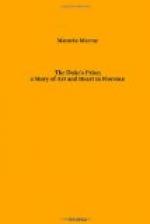The critical reader may perhaps question the propriety of Carlton’s wounding Petro at all, inasmuch as he is represented to be able to have defended himself with comparative ease from the heated and headstrong Italian’s sword. In answer to this, we would say, that besides there being always the possibility of his being wounded by the enemy’s sword, the very fact of his returning to the fight when severely wounded, showed that Carlton had rightly judged of his character, its vindictive impulses, when he deemed both wounds necessary. He gave the second one unwillingly; and not one moment before he thought it absolutely necessary to do so; all those on the ground could have borne testimony that there was scarcely an instant of time that Carlton had not Petro’s life at his command, if he had chosen to take it.
“Why, Carlton,” said a merry-faced Englishman, who had been his companion during the interview, and who was now walking with him down the mountain’s side, “I could hardly believe my eyes to see thee such a master of thy weapon. How hast thou possibly attained to such extraordinary proficiency with the sword?”
“You remember the little Frenchman, who lived so long with me?” asked Carlton. “He who had his snuff-box ever in his hand?”
“That I do,” said his companion; “and a merry, studious, jocund, lazy, cowardly and brave little fellow he was. In short, I believe there was no quality, however contradictory-good, bad, or indifferent-that he did not possess.”
“He was a bundle of inconsistencies,” added Carlton, smiling at his friend’s description.
The truth was, he had accurately described a certain class of that versatile nation, the French, which are often met with in every country, wanderers or exiles from home. While we write, we have one in our own mind, well known to our good citizens who is familiarly designated by the sobriquet of “the Emperor.”
“Well, Carlton, what of our little knight of the snuff-box, eh?”
“You remember that I was poor in those days, and the clever little Frenchman offered to teach me the sword exercise, if I could teach him to speak English. It was a bargain, and so did he, and so did I, until I flatter myself both became proficients in their distinctive branches of learning. Carnot taught the exercise in the Grand Army; so he graduated in a good school, and was indeed an excellent master of the weapon. It has been my only recreation and exercise for nearly a year; and I confess I feel quite at home with a good blade in my hand.”
“You use it with wondrous skill.”
“Do you think so?”
“Certainly; even his second complimented you, and said blade was never more skilfully handled.”
“This Petro Giampetti is also a good swordsman,” said Carlton, “and with a little more coolness would carry a sure point. The pistol is the weapon for your hot-headed fellow; he does not find a chance while using it to work himself into a passion, as with the sword.”




